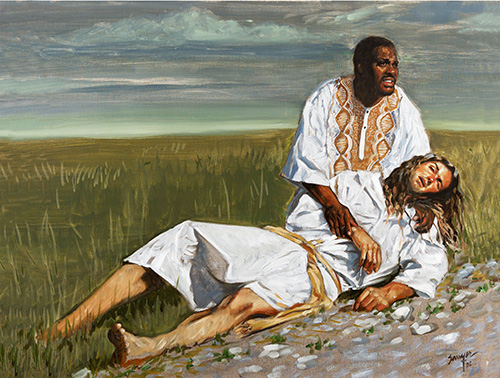One of my favorite parables of Jesus is the story about “The Good Samaritan” (Luke 10:25-37).
This story is simple, direct, and familiar — and usually dissected and analyzed into vaporous abstractions precisely because it is so simple, direct, and convicting. This story is unsettling simply because, like many of Jesus’ parables and stories, the setting and situation have become so familiar.
We probably all know the bare bones of the story; a man is robbed, beaten, and stripped of his clothes and left for dead on the side of a road. But it is not just any road; it is the road to Jerusalem, the epicenter of Jewish worship and religious identity.
Two religious men, a priest and a Levite — both devout, proper, and respectable — see the man, notice him, and keep walking.
A third man, a much despised, mixed-blood — his people universally hated by the Jews — stops, sacrifices his time and money, and is willing to incur future expenses for someone he does not know.
The “lesson” is all too clear about who the “good guy” is of the story — not the two “religious” people, but the non-religious person who, out of sheer (and apparently rare) human decency, stops what he is doing to help a stranger.
When I was a kid, it was one of my favorite stories perhaps because of its danger, drama, and unexpected rescue. But now, I find that few preachers use the story in sermons. And some people don’t seem to like it when they do.
In this story, Jesus did what he often did — he answered a question in an unexpected way. Jesus often answered a question with another question, but here he answers a question by answering a different question.
The question asked is “Who is my neighbor?” But the question Jesus answers is the one most of us really want the answer for: “Who is NOT my neighbor?” or even “Who would we WANT as our neighbor?”
We, like the questioner in this parable, want to be seen as generous, compassionate, and helpful — as “good” people — as long as it doesn’t cost us very much, intrude on our lives, take our time, and it is for someone we want to help and they “deserve” it. Or any other excuse we can come up with to defend our refusal to actually be of assistance when it is most needed.
Our cities are full of “religious” people — those who define themselves as “good” people of faith. Our cities are also filled with broken, abused, forsaken individuals, barely visible to most of us, in our streets, on our doorways, and in far too many of our public places.
Most of us are in the habit of walking — or driving — by. We have our reasons for not stopping or caring. We are too busy, we don’t have time, there are too many of them, they are not our problem, there’s nothing I can do, they deserve where they are, or a hundred other excuses that come all too easily.
Our excuses don’t matter. They don’t matter to God, to those whose glance we avoid, or even to ourselves.
We justify ourselves and keep walking. That’s alright. Jesus knew, and poor people in need know that is what proper and religious people do.
I might wish them well, even pray for them, maybe even give them a dollar or two, but don’t expect me to touch them or, in most cases, give them more than a pitying or judgmental glance.
Yes, I am thankful that I am not in their place, and “someone” really should help these people, but don’t expect me to.
Several years ago, in the church I still attend, we were discussing this parable and the evasions and justifications for those who walked by emerged from every corner of the room. And suddenly I saw that nothing had changed. Most of us, two out of three by Jesus’ equation, would still walk by.
Our “faith” is a collection of beliefs and theological presuppositions. And that makes us happy and safe. But Jesus, as always, has a different — and not always “safe” formula.
His “hero” is not the one who keeps his faith, his reputation, and his daily agenda intact, but the one who gives it all up for a total stranger.
So go ahead, keep walking; you are in good company. You will keep to your schedule, keep your hands clean, maybe even send good thoughts and prayers to those on your streets, and no one will ever know that you kept on walking.
But consider this: when we see people in need in front of us and cannot take a moment to help them, perhaps it is not those individuals who are the real problem — perhaps we are.

